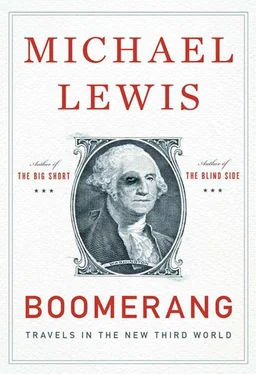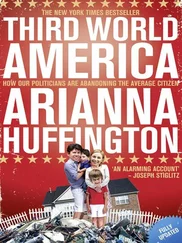With Röthig’s help IKB created, in effect, a bank, incorporated in Delaware and listed on the exchange in Dublin, Ireland, called Rhineland Funding. They didn’t call it a bank. If they had called it a bank, people might have asked why it was not regulated. They called it a “conduit,” a word that had the advantage that no one understood what it meant. Rhineland borrowed money for short periods of time by issuing something called commercial paper. They invested it in longer-term “structured credit,” which turned out to be a euphemism for bonds backed by American consumer loans. Many of the same Wall Street investment banks that raised the money for Rhineland (by selling the commercial paper for them) sold Rhineland the bonds backed by the American consumer loans. Rhineland’s profits came from the difference between the rate of interest it paid on the money it borrowed and the higher rate of interest it earned on the money it lent through its bond purchases. As IKB guaranteed the entire enterprise, Moody’s rating service gave Rhineland its highest rating, enabling Rhineland to borrow money cheaply.
The Germans in Düsseldorf had one critical job: to advise this offshore vehicle they had created about which bonds it should buy. “We are one of the last to get our money out of Rhineland,” Röthig told Risk magazine, “but we’re so confident of our ability to advise it in the right way that we still make a profit.” Röthig further explained that IKB had invested in special tools to analyze the complicated bonds, called collateralized debt obligations (CDOs), that Wall Street was now peddling. “I would say it has proven a worthwhile investment because we have not faced a loss so far,” he said. In February 2004 all this seemed like a good idea—so good that lots of other German banks copied IKB, and either rented IKB’s conduit or set up their own offshore vehicles to buy subprime mortgage bonds. “It sounds like quite a profitable strategy,” the man from Moody’s who had awarded Rhineland’s commercial paper a triple-A rating told Risk magazine.
I met Dirk Röthig for lunch at a restaurant in Düsseldorf, on a canal lined with busy shops. From their profitable strategy IKB has announced losses of roughly $15 billion, though their actual losses are probably greater, as German banks are slow to declare anything. Röthig viewed himself, with some justice, more as victim than perpetrator. “I left the bank in December 2005,” he says quickly, as he squeezes himself into a small booth. Then he explains.
The idea for the offshore bank had been his. The German management at IKB had taken to it, as he put it, “like a baby takes to candy.” He’d created the bank when the market was paying higher returns to bondholders: Rhineland Funding was paid well for the risk it was taking. By the middle of 2005, with the financial markets refusing to see a cloud in the sky, the price of risk had collapsed: the returns on the bonds backed by American consumer loans had collapsed. Röthig says he went to his superiors and argued that, as they were being paid a lot less to take the risk of these bonds, IKB should look elsewhere for profits. “But they had a profit target and they wanted to meet it. To make the same profit with a lower risk spread they simply had to buy more,” he says. The management, he adds, did not want to hear his message. “I showed them the market was turning,” he says. “I was taking the candy away from the baby, instead of giving it. So I became the enemy.” When he left, others left with him, and the investment staff was reduced, but the investment activity boomed. “One-half the number of people with one-third the experience made twice the number of investments,” he says. “They were ordered to buy.”
He goes on to describe what appeared to be a scrupulous and complicated investment strategy but was actually a mindless, rule-based investment strategy. IKB could “value a CDO down to the last basis point,” as one admiring observer told Risk magazine in 2004. But in this expertise was a kind of madness. “They would be really anal about, say, which subprime originator went into these CDOs,” says Nicholas Dunbar. “They’d say we won’t take loans from First Franklin but we will take them from Countrywide. But it didn’t matter. They were arguing about bonds that would collapse from one hundred [par] down to two or three [percent of par]. In a sense they were right: they bought the bonds that went to three, rather than to two.” As long as the bonds offered up by the Wall Street firms abided by the rules specified by IKB’s experts, they got hoovered into the Rhineland Funding portfolio without further inspection. Yet the bonds were becoming radically more risky, because the loans that underpinned them were becoming crazier and crazier. After he left, Röthig explains, IKB had only five investment officers, each in his late twenties, with a couple of years’ experience: these were the people on the other end of the bets being handcrafted by Goldman Sachs for its own proprietary trading book, and by other big Wall Street firms for extremely clever hedge funds that wanted to bet against the market for subprime bonds. The IKB portfolio went from $10 billion in 2005 to $20 billion in 2007, Röthig says, “and it would have gotten bigger if they had had more time to buy. They were still buying when the market crashed. They were on their way to thirty billion dollars.”
By the middle of 2007 every Wall Street firm, not just Goldman Sachs, realized that the subprime market was collapsing, and tried frantically to get out of their positions. The last buyers in the entire world , several people on Wall Street have told me, were these willfully oblivious Germans. That is, the only thing that stopped IKB from losing even more than $15 billion on U.S. subprime loans was that the market ceased to function. Nothing that happened—no fact, no piece of data—was going to alter their approach to investing money.
On the surface the IKB’s German bond traders resembled the reckless traders who made similarly stupid bets for Citigroup and Merrill Lynch and Morgan Stanley. Beneath it they were playing an entirely different game. The American bond traders may have sunk their firms by turning a blind eye to the risks in the subprime bond market, but they made a fortune for themselves in the bargain, and have for the most part never been called to account. They were paid to put their firms in jeopardy, and so it is hard to know whether they did it intentionally or not. The German bond traders, on the other hand, had been paid roughly one hundred thousand dollars a year, with, at most, another fifty-thousand-dollar bonus. In general, German bankers were paid peanuts to run the risk that sank their banks, which strongly suggests that they really didn’t know what they were doing. But—and here is the strange thing—unlike their American counterparts, they are being treated by the German public as crooks. The former CEO of IKB, Stefan Ortseifen, was given a jail term (since suspended) and has been asked by the bank to return his salary: 805 thousand euros.
Dirk Röthig had enjoyed a ringside seat not only to IKB but to the behavior of its imitators, the German state-backed banks, the Landesbanks. And in his view, the border created by modern finance between Anglo-American and German bankers was treacherous. “The intercultural misunderstandings were quite intense,” he says, as he tucks into his lobster. “The people in these banks were never spoiled by any Wall Street salesmen. Now there is someone with a platinum American Express credit card who can take them to the Grand Prix in Monaco, takes you to all these places. He has no limit. The Landesbanks were the most boring bankers in Germany so they never got attention like this. And all of a sudden a very smart guy from Merrill Lynch shows up and starts to pay a lot of attention to you. They thought, ‘Oh, he just likes me!’” He completes the thought. “The American salespeople are much smarter than the European ones. They play a role much better.”
Читать дальше












